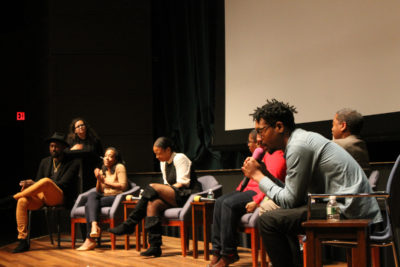
“Enjoy is not the word,” Damon Davis said to the audience. “Pay attention.”
This is how Davis, the co-director of “Whose Streets?” — a documentary about police brutality — kicked off the Wednesday night screening and panel discussion, which attracted about 300 Boston University community members to the Tsai Performance Center.
The film documented the unrest in Ferguson and St. Louis after the shooting of unarmed African-American teenager Michael Brown by a police officer in 2014, which spurred the Black Lives Matter movement.
Discussion moderator Jessica Simes, a BU sociology professor, said the film addresses many issues relevant both to her field and the BU community as a whole.
“Many of our faculty are addressing questions of race, inclusion, diversity, social movements, and there’s a lot of those themes packed into the film. Urban sociology, gender and sexuality even come up in the film,” Simes said before the panel. “The film is a great way to bring students into a sociological mindset.”
Panelist Saida Grundy, an African-American studies and sociology professor at BU, wrote in an email that the film could educate BU students on the importance of social justice issues.
“It is of dire importance that BU students understand what movements like BLM are fighting for, how positive social change is created, and their own roles in bringing about justice for marginalized groups of Americans,” Grundy wrote.
In addition, Phillipe Copeland, a professor in the School of Social Work, said that reflecting on the unrest in Ferguson could help explain and shed light on today’s political climate.
“I don’t think it could be more timely to revisit the significance of this particular contemporary black rebellion in the United States,” Copeland said before the panel. “I think in some ways, that what happened in Ferguson was a foreshadowing of the moment that we’re living in now.”
Davis, the film’s co-director, began the panel discussion with a reminder that tragedy had to occur for the documentary to be made in the first place.
“This movie, this movement, was facilitated by the death of a young man who should not have been killed,” Davis said. “We should not be talking about him in the past tense. He should be here, and he should be alive.”
Panelist Pamela Lightsey, a professor in the School of Theology, emphasized the importance of taking action beyond the classroom.
“It’s one thing to be erudite and articulate these things, but what are we going to do on the streets for our people?” Lightsey said. “That’s what I’m concerned about. That’s what I’m trying to share with students in the classroom.”
Several students said the film and panel discussion were thought-provoking and important to discuss on college campuses like BU.
Fardowsa Abdulle, a junior in the College of Engineering, said audience turnout at screenings like this should encourage BU to continue hosting similar events.
“There has to be attendance for things like this because it shows that it’s important, it shows that it’s wanted and it shows that it’s necessary on campus,” Abdulle said.
College of Arts and Sciences senior Renee Metelus said she thinks conversations about these issues are important because they expose students to differing but necessary opinions.
“I feel like these are conversations that we should have because they shape the way different people experience the world,” Metelus said. “I may interpret or experience police brutality or racism in a different way than someone else does.”
Jessica Samuel, a second-year doctoral student in the Graduate School of Arts and Sciences, said she thinks discussing racial issues at BU is important because university communities reflect society as a whole.
“I think it starts with these real conversations around race, around movements, around racism,” said Samuel, who used to teach at a high school in St. Louis. “BU’s a university, so whatever happens in large society is perpetuated here in a more microcosmic way.”
Jennifer Small is a junior in the Boston University College of Communication, majoring in journalism and minoring in media science. She is one of the Co-Campus News Editors for Spring 2023.


Saida Grundy is a vile anti-male, anti-white racists who is not in a credible position to discuss racial justice.